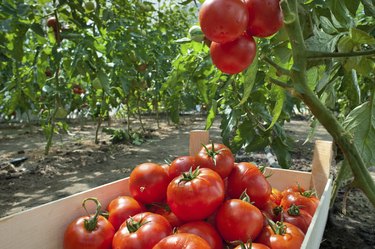
Taking steps to keep bugs away from tomato plants (Solanum lycopersicum, USDA hardiness zones 10-11) can reduce the chances of your harvest getting ruined. A popular addition to vegetable gardens, tomatoes are susceptible to a number of pests. Tomato hornworms, tomato fruitworms, whiteflies, aphids and cutworms are common pests that attack the plants. While you can't guarantee that all insects will stay away, you can discourage pests from attacking your homegrown tomatoes with a variety of techniques.
Start Tomato Plants Indoors
Video of the Day
Starting your tomato plants from seed indoors gives them a head start on the growing season. It also gives them a chance to grow into strong seedlings before they go outdoors and are potentially exposed to bugs. The stronger the tomato plant, the more resistant it is to pest infestations. Sow your seeds using a seed-starter kit about six to eight weeks before the last expected frost in your area.
Video of the Day
Clean the Garden Bed
Pests can overwinter in weeds and old garden debris and then attack your tomato plants in the spring. Cleaning out old plants at the end of the growing season can help keep bugs away from tomato plants. Clear any weeds or other debris from the garden area before you plant. Using a garden tiller to work the soil can also help get rid of insects.
Use a Plant Collar
Cutworms can attack your tomato plants while they're still seedlings right after they're transplanted. They eat the stem near the soil line, potentially killing your plants. Placing a cardboard collar around the base of the plant stem while the tomato plant is young can prevent cutworms from attacking. You can also wrap aluminum foil around the base of the plant. You only need the collar until your tomato plant has several sets of leaves growing on it.
Choose Companion Plants Wisely
Companion planting refers to choosing plants that can benefit one another. When planted near tomatoes, some plants can help repel pests. Plan your garden layout accordingly for a natural pest deterrent.
Borage (Borago officinalis) planted near your tomatoes can discourage tomato worms. French marigolds (Tagetes patula) can also help control bugs, particularly nematodes, but they work best when thickly grown on site instead of being transplanted and tilled into the soil at the end of the growing season for next year's tomato crop.
Other plants near your tomatoes could make things worse. The same type of worm attacks both corn (Zea mays) and tomatoes, so you don't want them near one another. Onions and garlic, both in the Allium genus, can encourage thrips, which may also attack tomato plants. While not a pest issue, potatoes (Solanum tuberosum) and tomatoes are both susceptible to blight and don't make good garden neighbors.
Encourage Natural Predators
Many tomato pests have natural insect predators that can help keep bugs away from tomato plants. Parasitic wasps are natural predators to tomato hornworms. Ladybugs and lacewings can help control aphids and whiteflies. Encouraging those insects in your garden can help reduce the tomato pest population. Avoid using insecticides when possible, as they could also kill those natural predators that keep tomato pests under control.
Inspect for Bugs
Even with careful measures, some tomato pests can slip into your garden. Inspect your plants regularly to look for bugs or signs of damage. Many pests, such as hornworms, can be controlled by handpicking and destroying the bugs. Spotting the bugs early also lets you know when you need to treat your plants with an insecticide to control the pests before they take over.
Keep Tomato Plants Healthy
One of the easiest ways to keep bugs away from tomato plants is by keeping the plants strong and healthy. Weak plants are more susceptible to insect damage.
Water your tomato plants regularly when you don't get enough rain, ensuring the plants get about 2 inches of water total per week. Mulching can also help retain moisture. If your tomatoes become water stressed, the sap that whiteflies suck from plants becomes more nutritious and attractive to the pests. Too much nitrogen can have the same effect, so be cautious when fertilizing your tomatoes.